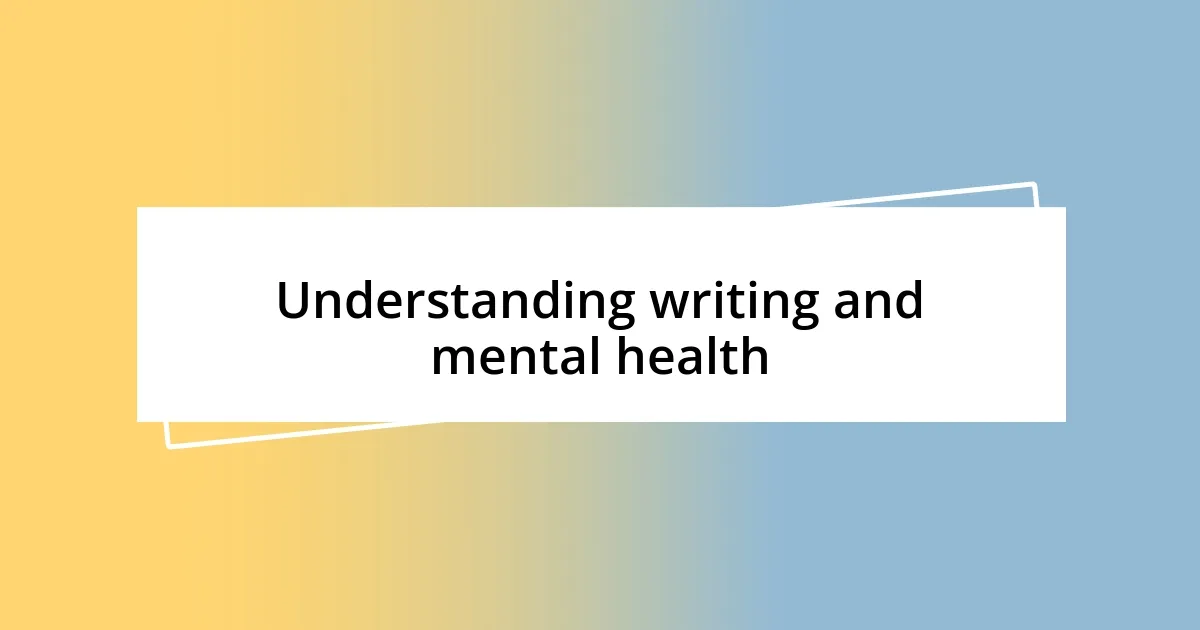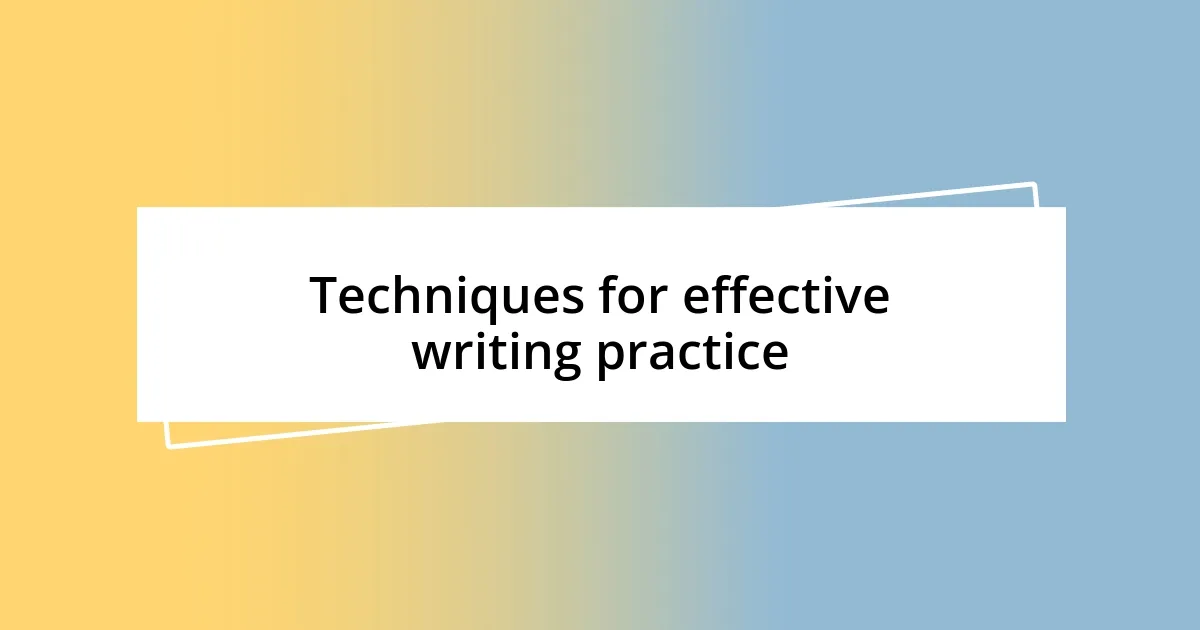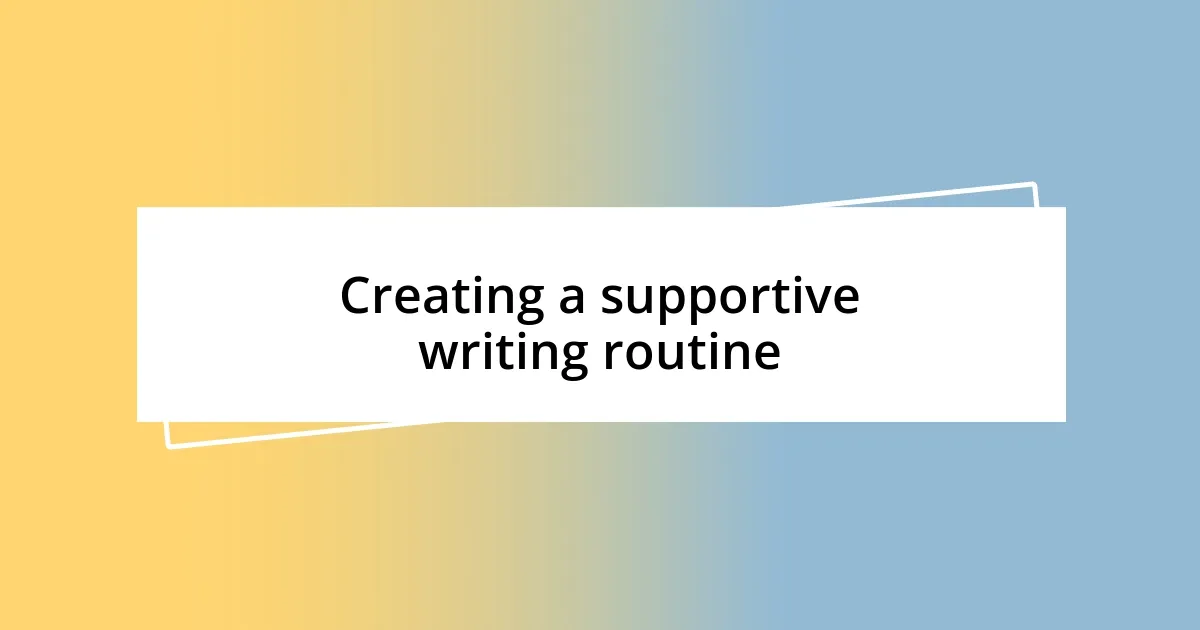Key takeaways:
- Writing serves as an emotional release and promotes mental clarity, helping individuals articulate chaotic feelings.
- Utilizing writing as a therapeutic tool fosters self-reflection and personal growth through documenting experiences.
- Establishing a consistent writing routine enhances creativity and allows exploration of different styles and formats.
- Overcoming writer’s block can be achieved by changing the environment, creating a supportive atmosphere, and engaging with a writing community.

Understanding writing and mental health
Writing can serve as a powerful tool for mental health, acting as an emotional release for many. I remember a particularly stressful period in my life when I turned to journaling to process my overwhelming feelings. It was like lifting a weight off my shoulders; each word seemed to pull from a deep well of emotions I didn’t even know I had.
Have you ever felt trapped in your thoughts, unable to express what’s swirling inside? I certainly have. There were days when just the act of putting pen to paper—or fingers to keyboard—felt like a lifeline. Writing allows me to articulate feelings that can often feel chaotic. With each sentence, I create clarity.
When exploring our thoughts through writing, we invite introspection. It can reveal patterns and insights about our mental health that we may not notice otherwise. I often find myself reflecting on past experiences, realizing how my writing has documented my growth or even the darker times. Isn’t it fascinating how the simple act of writing can help us understand ourselves better?

Writing as a therapeutic tool
Writing as a therapeutic tool can be remarkably liberating. I once faced a challenging breakup that left me feeling shattered and lost. During that period, I wrote letters to my past self, explaining my choices and emotions. These letters never saw the light of day, but they allowed me to confront and process my feelings, ultimately leading to healing.
There was a time when I struggled with anxiety, often feeling like I was on a hamster wheel of thoughts. Expressing those thoughts on paper helped me create a pathway through my mind’s chaos. It was as if my pen had the power to untangle the knots in my brain. Whenever I reread those entries, I could see my progress and resilience. It’s amazing how powerful writing can be in mapping our emotional landscape.
Additionally, writing isn’t just about the act itself; it’s also about the reflection that comes afterward. I’ve kept journals for years, and flipping through those pages is like revisiting a different version of myself. It reminds me of the challenges I’ve overcome and the lessons I’ve learned along the way. What better way to explore our journey than by capturing it in words?
| Benefits of Writing | Personal Experience |
|---|---|
| Emotional Release | Writing letters to my past self helped me confront my breakup. |
| Clarity of Thoughts | Documenting my anxiety revealed how writing untangles my chaos. |
| Self-Reflection | Journals allow me to revisit and acknowledge my growth. |

Techniques for effective writing practice
Writing is a practice that flourishes with consistency. Personally, I’ve found that setting aside dedicated time each day can significantly enhance my writing skills. Whether it’s just 10 minutes or an hour, that routine nurtures my creativity. Here are a few techniques that have worked for me:
- Free Writing: I let my thoughts flow without judgment, targeting a stream-of-consciousness approach.
- Prompts: Using writing prompts can spark new ideas and push me out of my comfort zone.
- Set Goals: I find it helpful to set achievable writing goals, like word count or completing a specific task.
When I began to explore different formats and styles, my writing practice transformed. I started with poetry, not because I felt particularly talented, but to express fleeting emotions. This exploration led me to craft short stories, where I could weave my experiences into fictional narratives. It was incredibly satisfying to see my feelings echoed back in the characters I created. These iterations are wonderfully freeing, as they allow me to play with language and shape my unique voice.

Overcoming writer’s block challenges
Writer’s block can feel like a heavy weight pressing down on creativity. I remember a time when I sat staring at a blank page, frustration creeping in. At that moment, I chose to step away and take a walk. Sometimes, a change of scenery is the best way to unlock those dormant ideas; breathing in fresh air can inspire new thoughts and perspectives. Have you ever felt that sudden rush of clarity after distancing yourself from a problem?
Another strategy that has worked wonders for me is creating a routine filled with small, intentional rituals around writing. Lighting a candle or playing soft music enhances the ambiance and signals to my brain that it’s time to create. These little enhancements transform the experience for me. It’s almost like inviting an old friend over for a chat – the more comfortable you feel, the easier the conversation flows.
I also lean heavily on the power of community when I’m stuck. Sharing ideas with fellow writers can be invigorating. I recall participating in writing groups where we’d exchange snippets of our work. The feedback was often enlightening, igniting sparks of inspiration that I hadn’t anticipated. Have you ever noticed how sharing ideas can open new pathways in our minds? It’s a reminder that we’re not alone in this journey, and collaboration can break down those mental walls.

Creating a supportive writing routine
Creating a writing routine that supports both creativity and mental health is vital. I’ve noticed that starting my writing sessions with a short meditation can create a calm environment, allowing my thoughts to settle before diving into the chaos of ideas. Have you tried taking a few deep breaths to center yourself? It really helps me transition into a focused mindset.
In addition to setting the mood, I believe the physical environment plays a crucial role too. I learned this the hard way when I attempted to write in noisy cafés, only to end up frustrated and distracted. By creating a cozy nook in my home filled with plants and soft lighting, I found that my productivity skyrocketed. It’s incredible how a little comfort can shift your creative energy!
Lastly, I find that keeping a journal to track my emotions and writing progress is invaluable. It’s not just about the words on the page; it’s about understanding what I’m experiencing through the writing process. Reflecting on both triumphs and struggles reminds me why I love writing in the first place. Have you thought about how journaling might reveal insights you didn’t even realize were there? I’m always surprised by the connections I uncover.













